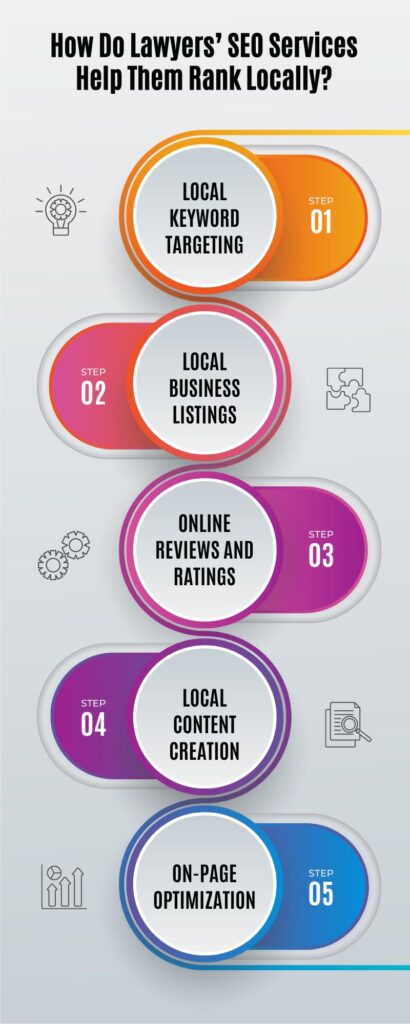Law Firm SEO
What is SEO?
- SEO involves making improvements to a website’s content, speed, performance, and authority in order to increase its visibility for relevant searches.
- The number one goal of SEO is to hit the top spot on Google for your target keywords.
- When your law firm’s website appears higher in search results, you have a better chance of attracting potential clients actively searching for legal services. This increased visibility allows your law firm to stand out from competitors and position itself as a trusted authority in the legal industry.

Difference between SEO and PPC
1. Approach:
PPC: PPC involves paying for ads to show on the searches for your target keywords. Advertisers bid on specific keywords, and they are charged each time someone clicks on their ads.
2. Cost:
PPC: PPC involves paying for each click on your ads. The cost depends on the competitiveness of the keywords and the quality of your ads. It can provide instant visibility but be more expensive, especially for highly competitive keywords.
3. Speed of Results:
4. Organic vs. Paid Traffic:
PPC: PPC focuses on generating paid traffic, which refers to the visitors who click on your ads and land on your website. You can bid for specific keywords and audiences with PPC ads to drive targeted traffic.
Why is SEO important for law firms?
- Most people use search engines to find legal services.
- A well-optimized website will enjoy a higher search engine ranking and click through rate, increasing the chances of prospective clients finding your firm online.
- Higher search rankings translate into increased website traffic that can ultimately turn into qualified leads for your firm. In fact, a well implemented SEO plan can be one of the best lead generation strategies for your law firm.
- It can lead to people coming on to your website and filling in the forms or get your phones ringing.
- SEO can give your firm a competitive advantage by making your services more visible than those of other law firms.
- With the help of local SEO, law firms can target specific geographical areas relevant to their practice areas. It takes away the cost of competing with keywords at a national level. If we look at the keyword difficulty, it is definitely easier and more cost-effective to rank for a keyword like “top personal injury lawyer in Fort Lauderdale” vs. a generic keyword like “top personal injury lawyers.”
- Last but not least, SEO, with its focus on quality content, can help establish your authority in your niche and showcase your attorneys as thought leaders.
Implementing SEO for Law Firms
Keyword Research
- This involves identifying the terms or phrases your target audience may use when searching for legal services.
- Identifying the search intent plays a crucial role here. The goal is not to increase the website traffic in a non-strategic way but to get clicks on Google or Bing for keywords with the right search intent and potential to turn into potential clients. The quality of your law firm’s website traffic is of utmost importance.
- Tools like Ahrefs and SEMrush can be used to do keyword research.
- Look for popular and relevant keywords that have a good search volume.
On-Page SEO
- ncorporate the identified keywords naturally into your website content, blog posts, and images. It includes elements like title tags, meta descriptions, headers, and images.
- Doing this will aid the search engines in understanding the relevance of your content to the search queries.
- Including long-tail keywords is equally important as they are specific search terms and show more precise search intent. An example of a long-tail keyword would be “digital marketing for law firms.”
- A great on-page SEO strategy is hyperlinking the pages on your website. These internal links help boost the average time spent on your website and clearly indicate to search engines that the content is helpful to the target audience.
Content Creation
- Create high-quality and informative content that is valuable to your target audience.
- E-A-T: Make sure your content showcases expertise, authoritativeness and trustworthiness. This is especially important for law firms where the need for accuracy is really important.
- This can include blog posts, articles, case studies, and FAQs.
- By regularly publishing blog posts, articles, and other types of content that address common legal questions and provide valuable insights, you can establish your law firm as an authority in your practice area.
- This helps attract organic traffic and increases the chances of other websites linking to your content, which can further boost your search engine rankings.
Off-Page SEO
- This involves actions taken outside your website, impacting your performance on search engines.
- It includes techniques like link-building, social shares, and guest blogging.
- Building high-quality backlinks to your website can significantly improve your SEO. Guest Blogging, cross promotions, and outreach to other legal websites or directories are ways to get high-quality backlinks.
- In the eyes of search engines, a backlink is seen as a vote of confidence in your website’s authority and relevance.
- However, it’s crucial to focus on acquiring natural and relevant backlinks from trustworthy sources rather than engaging in unethical practices like buying links.
Local SEO
- If your law firm serves a specific geographic area, you must optimize your website for local search results.
- You will have to optimize your website and online profiles for local keywords, such as “lawyer in [city]” or “attorney near me.”
- It also includes creating and optimizing your Google My Business listing, online directories and obtaining positive reviews from satisfied clients.

Mobile Optimization
- If your law firm serves a specific geographic area, you must optimize your website for local search results.
- You will have to optimize your website and online profiles for local keywords, such as “lawyer in [city]” or “attorney near me.”
- It also includes creating and optimizing your Google My Business listing, online directories and obtaining positive reviews from satisfied clients.
Technical SEO
- Pay attention to technical aspects of SEO, such as website speed, crawlability, URL structure, and schema markup.
- Make sure that your website’s sitemap has been submitted to Google.
- Your site structure should be SEO-friendly. By site structure, we mean the way the pages on your site have been linked together. An effective way to organize your site is to allow for easy navigation. Search engine crawlers should get to all the content on your website easily and quickly.
- There should be no room for orphan pages. These pages don’t have any internal links pointing toward them, making it difficult for search engines or website visitors to find them.
- Install SSL certificate.
- Find and fix duplicate content issues.
Getting results from SEO is an ongoing process and requires regular monitoring and optimization. By working on these strategies, you can improve your law firm’s visibility in search engine results and attract more potential clients.
Monitoring SEO Results
- Pay attention to technical aspects of SEO, such as website speed, crawlability, URL structure, and schema markup.
- Make sure that your website’s sitemap has been submitted to Google.
- Your site structure should be SEO-friendly. By site structure, we mean the way the pages on your site have been linked together. An effective way to organize your site is to allow for easy navigation. Search engine crawlers should get to all the content on your website easily and quickly.
- There should be no room for orphan pages. These pages don’t have any internal links pointing toward them, making it difficult for search engines or website visitors to find them.
- Install SSL certificate.
- Find and fix duplicate content issues.
Getting results from SEO is an ongoing process and requires regular monitoring and optimization. By working on these strategies, you can improve your law firm’s visibility in search engine results and attract more potential clients.
Monitoring SEO Results
1. Google Analytics
2. Track Keyword Rankings
3. Analyze Organic Search Traffic
4. Set up Goals and Conversions
5. Regularly Review and Adjust Your SEO Strategy
FAQs on Law Firm SEO
How do Lawyers’ SEO Services Help Them Rank Locally?
Lawyers’ SEO services can help to rank locally by implementing various strategies that optimize a law firm’s online presence for local search. Here are some ways in which SEO services from an expert team can help with local ranking:
1. Local Keyword Targeting
2. Local Business Listings
3. Online Reviews and Ratings

4. Local Content Creation
5. On-page Optimization
Optimize the law firm’s website for local search by implementing on-page SEO techniques such as optimizing meta tags, headings, and URLs with local keywords and including the law firm’s address and contact information on every page. It is also important to interlink the internal pages with the local keywords as anchor texts.
How Legal SEO Works

Does SEO Work for Lawyers?

In conclusion, when implemented correctly, SEO can be an effective strategy that law firms can leverage to boost their online visibility and attract more clients. By understanding and implementing SEO strategies, law firms can effectively compete in the digital marketplace.

